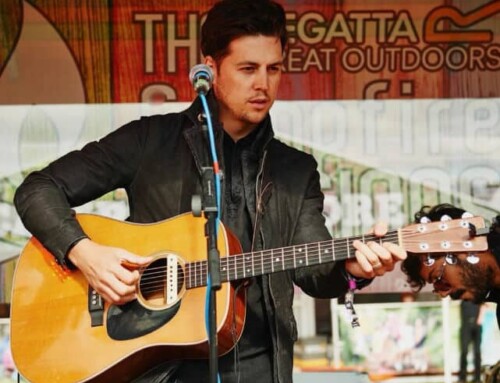At Front Row Music, we believe that music has the power to completely transform our lives, including our mental health. To honour Mental Health Awareness Week in coordination with The Lily-Jo Project, this article explores the importance of music to our society and our mental health.
Music and Society: The History
In 2009, the oldest known musical instruments were discovered in Germany, relics from the palaeolithic era. They are ancient flutes, carved from bone and are evidence that for almost as long as we have been gathering as human beings we have been creating music.
That music has also been connected to healing and spiritual growth. In ancient Greece, the Greek goddesses called the Muses were prayed to for healing and musical accomplishment. Even today, we often associate music with emotions. People might cry in church or a concert hall when they experience particularly beautiful music, or they might feel a sensation of community when they engage in music in public spaces. For instance at a football match or seeing a live band play.
Music also has the ability to create change in society. Consider the power of protest songs, how one moment of music can change the world. It also has the ability to strengthen our societal bonds with one another. Music has become a fundamental part of how we develop relationships and mark occasions. For instance, the first dance ritual at a wedding, or the way parents teach lullabies to their children to soothe them. All of these are examples of how our society has music woven into it making us human beings who have been using music to relate to one another for millennia.
When asked about mental health and society, Front Row Music founder, Dave Fidler, said that “historically, music has been used to bring people together. That feeling of togetherness has a great impact on people’s mental health and I think that will be something that continues to happen.”
So why exactly does music benefit our mental health? What does it do to our brains that is so beneficial?
Music and Mental Health: The Science
The research around how music impacts our minds tells us that music engages our brains in a way that nothing else does. Researchers have seen how, when looking at a person listening to music in an MRI scanner, the brain lights up in a very specific way. Our minds are receptive to music and perhaps that means we enjoy its benefits in a whole host of different ways.
Music triggers the release of neurochemicals that can help boost our mental health. When we listen to or play music, our brains release dopamine, also known as the happy hormone, that we associate with pleasure and reward as well as serotonin, which is our bodies’ natural mood stabiliser. Listening to music, especially music combined with nature sounds, has been shown to lower levels of cortisol which is a stress hormone that can naturally lower anxiety and stress. Whilst listening to music before a stressful event can’t stop your cortisol levels from rising when the event occurs, listening to music after a stressful event can help you recover faster. Music therapy has also been proven to boost levels of oxytocin, a hormone that the brain produces that helps our ability to connect with others.
For these reasons, music has become a crucial part of some mental health therapies because of its ability to help treat people struggling with depression, anxiety, schizophrenia, and even dementia.
Music and Real Life
We can all experience the benefits of music in our own struggles with mental health. Founder of Front Row Music, Dave Fidler, expressed his own thankfulness for the role music has played in his mental health.
“Writing music has been an amazing outlet for me to process some huge life events. I didn’t realise that’s what was happening at the time, I just gravitated to my guitar, but I realise now that it helped me to express emotions that were difficult to talk about. When my father died I wrote a lot of songs and when my first child was born I wrote the longest song I have ever written.”
Professional counsellor and founder of The Lily-Jo Project, Lily-Jo, explains how building music into our self-care routines can be very beneficial.
“Music has been used therapeutically in lots of different ways but we can include it in our daily self-care to help us relax, exercise, let off steam and reflect! It’s a great tool for self-expression and recognising our own feelings too.”
The Lily-Jo Project’s Top 5 Tips for Using Music to Lift Your Mood
Front Row Music is a proud partner of The Lily-Jo Project, which is a platform devoted to eliminating the stigma of mental health through music and digital resources. Here are their top 5 tips for how to use music to benefit your mental health in a practical way.
1. Relaxation
Because music can be so helpful in relaxing after a high-stress day, it can be a great tool for meditation and mindfulness. Meditation sounds intense, but is just the practice of self-reflection, of giving yourself some time every day to check in with your emotions. It can be done with a simple breathing practise that is designed to lower your heart rate, reduce stress and anxiety, and/or mitigate panic attacks. Intrigued? This helpful video on The Lily-Jo Project website can guide you through it!
2. Motivation
Having a good exercise routine is a really important part of managing your mental health. It might be getting up and doing some gentle stretches, it might be going for a run or a walk in the sunshine. Whatever it is, sometimes we can struggle to get going, especially if we are feeling low. Music can be a great way to get us going. Choose your best motivation song and get moving! The combination of music and exercise will increase your dopamine and serotonin levels and have you feeling brighter and more awake in no time!
3. Stimulation
Music can be really helpful for giving you a boost of energy when you are struggling with low mood, depression, fatigue, or exhaustion. Sometimes, it can be really good to shove on an excellent tune and throw yourself a three-minute dance party, to give your mind a nice jolt of dopamine and make you feel a little better! Or, alternatively, maybe you need to put on a heavy metal song and have a good old scream to release some of that tension! Stimulating your mind with music and giving yourself a boost of hormones can help you feel more energised.
4. Creation
Not everyone can be a songwriter or a musician, but almost everyone has a song that they really feel ‘speaks’ to them and gives voice to their feelings inside. This can be particularly helpful if you are struggling to express your emotions. You could write down song lyrics and use them as a starting point for some journalling. Don’t think about what you are writing or judge it on whether it is ‘good’ or not, just write down exactly how these song lyrics relate to you. This creative process can be very satisfying and relieving when we are feeling overwhelmed or like our minds are too ‘full.’
5. Elation
Music can be joy. It can be community and fun and excitement. Music is also profoundly connected to memory, so utilise that. Play songs that are connected to joyful memories, share them with people in your life, and use those happy memories to boost your mood. Enjoy the music that you love and take joy from it!
Music Therapy: The Future
Our tutors see on a daily basis just how powerful music can be to help people overcome their emotional and social difficulties. Front Row Music founder, Dave Fidler, shares some of his favourite stories of how music has been a tool to build community bonds and emotional resilience.
“One of my favourite stories was we took some of the primary school children we teach into a local care home so that they could teach the elderly how to play the ukulele. One of the children formed such a lovely bond with an elderly resident that they went back to visit each week with their parent after the sessions had finished. That was a huge boost for the elderly person and the child described how it had made them feel really happy. That to me is music having a positive effect on people’s mental health within the community.”
Music as a therapeutic tool can be incredibly powerful when it comes to long-term mental health conditions such as dementia and Alzheimer’s disease. A study at the Mayo Clinic showed that whilst music doesn’t reverse memory loss, it has been shown to slow down the progression of the disease and the cognitive decline associated with it. It can help those afflicted remember portions of their lives that they might otherwise lose.
The Mayo Clinic suggests a practice that supports the individual’s needs by playing music that they are known to enjoy, not having any competing sounds, encouraging movement, and singing along. Studies show that musical memories are often preserved in Alzheimer’s disease because the key memories are related to areas of the brain that are not often impacted by the disease. Miraculously, this means that music can help hold onto memories of a person’s life that might otherwise be lost.
Music can also be a powerful force for good early on in an individual’s life. For example, it’s known to support early brain development along with social and emotional development in children. You can read more about this in our previous article, The Musical Child: How Music Helps Our Children Grow.
Top 5 Tips for Utilising Music in a Therapeutic Way
We’ve seen first-hand how music can benefit mental health at any age. If you’d like to incorporate more music in your classroom, workplace, or retirement community, we’ve put together a few practical tips that you can try. Whatever the concern, we believe that music can help us all grow and learn together.
1. Use lyrics to prompt discussion about mental health
Songwriting is part of what we offer at Front Row Music, and talking about what the lyrics of a song mean to us can be a great way to start a discussion about our own feelings and well-being.
2. Improvisation with instruments to express feelings
Sometimes, musical sounds can be a great way to express our feelings. Even if our students aren’t quite sure of how to play an instrument, making a racket on the drums or strumming a ukulele softly can express how they are feeling and help release pent-up emotions.
3. Use songs with positive memories
Just as in the Mayo study, we find that children respond best and learn better with songs that they like and know. They are also more likely to flourish if it’s a song with a positive message, feeling, or memory. Being aware of how music affects our memory can help us when working with other people.
4. Share music with those around you
Because playing and listening to music produces oxytocin, which helps us make connections, it can be a great way for those who struggle with social interactions to engage with others. Whether it’s a child who suffers with social anxiety or an older person who has withdrawn in social isolation, playing music together, singing together, or playing instruments together can help us reconnect with those around us in a positive way.
5. Be practical – create music or move to it!
The best benefits of music come from when we are practically engaged with it. We release the most positive hormones when we are making it ourselves with instruments, creating it in a community like a choir, or engaging it physically, like dancing or clapping. Try and include these activities to help people really receive the benefits that music has on mental health!
Final Thoughts
Our work as music educators goes beyond simply teaching children a few chords on the guitar. We know that music has the power to transform people’s lives and change their mental health for the better.
It was the children’s author, Hans Christian Anderson, who said that “Where words fail, music speaks.” There is still a stigma around mental health in our world today, that organisations like the Lily-Jo Project seek to combat. There are many people who still struggle to find the words to express how they are feeling or struggling with their mental health.
At Front Row music, we hope that when those words fail, music can step in. Not just to fill the gaps in the words but also to provide help and comfort in times of need.
About Front Row Music
Front Row Music specialises in primary school music tuition, teaching thousands of students in schools across the globe. Founded by British recording artist and musician, Dave Fidler, Front Row Music is committed to making music as fun and accessible for young people as possible, using songs that they already know and love.
Whether it’s guitar, ukulele, keyboard or beyond, Front Row Music’s lesson plans are specially designed to encourage and support students as they grow both in talent and passion for music.
Follow Front Row Music on Facebook, Instagram, YouTube, Twitter, and LinkedIn.
If you are interested in having Front Row Music teach at your school, simply fill out this contact form to receive an information pack.
If you are interested in becoming a franchisee, you can learn more and request an information pack here.
About The Lily-Jo Project
The Lily-Jo Project is an award-winning platform devoted to eliminating the stigma of mental health through music, digital resources, and community engagement. Founded by UK-based pop singer/songwriter, Lily-Jo, The Lily-Jo Project is committed to providing high-energy mental health resources and events for schools and community groups worldwide.
To access The Lily-Jo Project’s free mental health resources, visit www.thelilyjoproject.com/#help.
To explore The Lily-Jo Project’s online mental health curriculum for primary and high schools, visit www.thelilyjoproject.thinkific.com.
To enquire about a live event, please reach out to admin@thelilyjoproject for pricing and booking information.
References
“The Benefits of Listening to Music.”
https://www.healthline.com/health/benefits-of-music#mood-boost
“The Neurochemistry of Music” by Mona Lisa Chandra and Daniel J Levitin
https://www.sciencedirect.com/science/article/abs/pii/S1364661313000491
“Can Music help someone with Alzheimer’s disease?” By Jonathan Graff-Radford MD.





